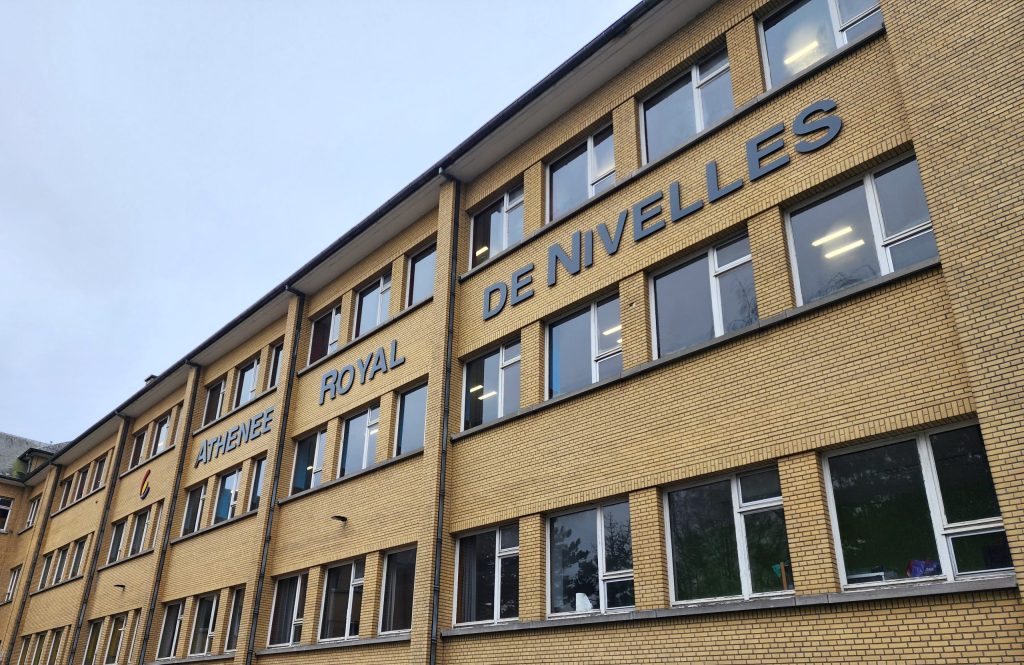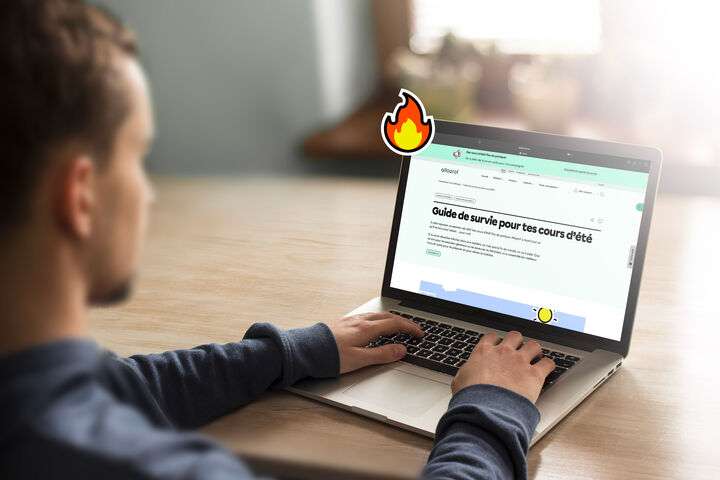Une partie de notre équipe a eu l’occasion de vivre une mission pédagogique en Belgique à la fin janvier 2023, au cœur de la Wallonie (la région francophone), pour y développer des liens avec différents intervenants et intervenantes de l’éducation, dont l’équipe de l’eduLAB. À cette occasion, quelques articles permettront de partager avec nos lecteurs des souvenirs des moments-clés.
Le 24 janvier 2023, notre équipe s’est rendue à l’Athénée Royal de Nivelles, une ville francophone située en région wallonne, dans la province du Brabant wallon, au sud de Bruxelles. Pour la petite histoire, Athénée Royal est l’appellation donnée aux établissements scolaires, le plus souvent d’enseignement secondaire et non confessionnels, dont le pouvoir organisateur est Wallonie-Bruxelles Enseignement.
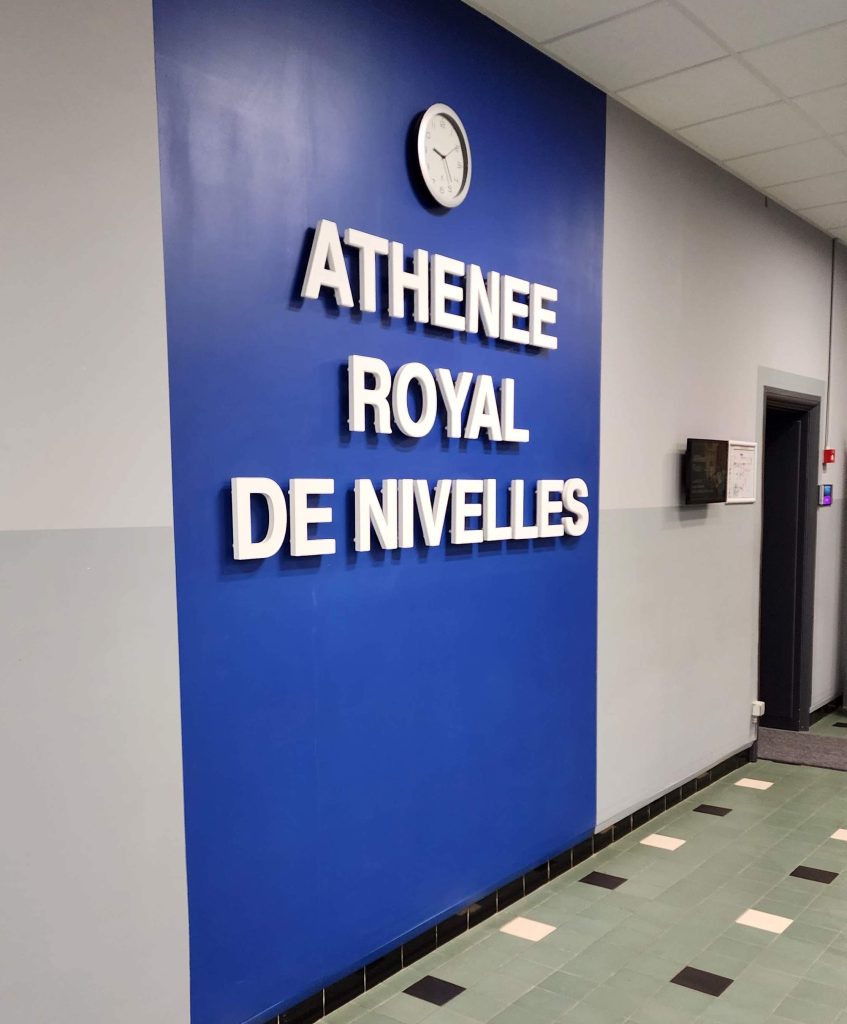
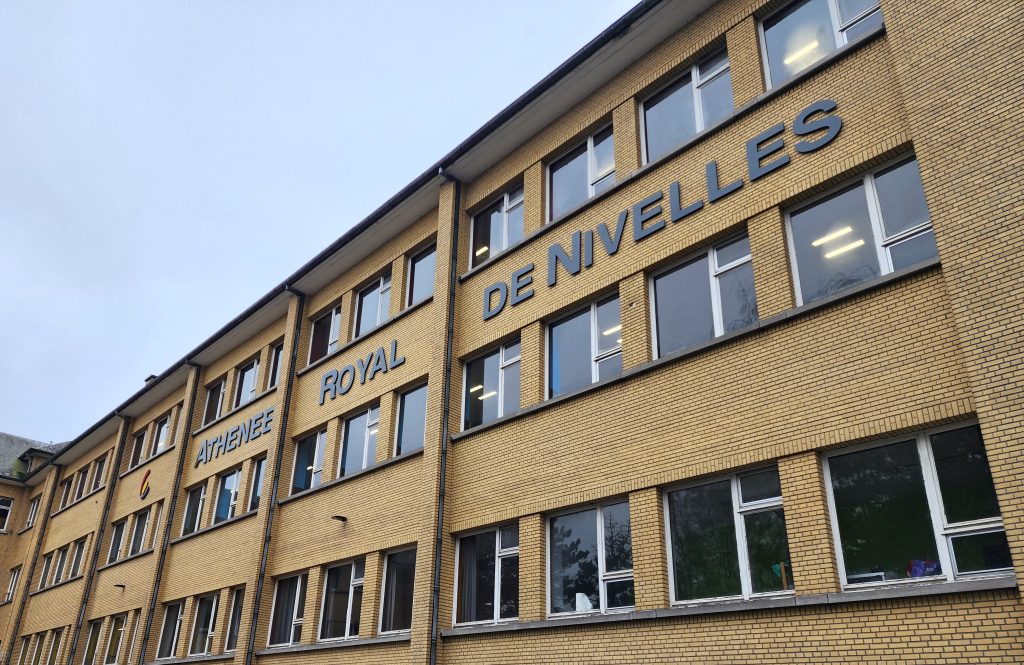
Notre équipe y a été accueillie notamment par Julien François, enseignant de sciences et fier ambassadeur du grand projet de son école, qui est d’ailleurs reconnue comme école distinguée Apple (Apple Distinguished School). Il a pris le temps de nous expliquer la démarche vécue au cours des dernières années pour en arriver là, démarche qui a visiblement été soutenue et encouragée par les directeurs ayant tenu la barre de l’établissement depuis, qui ont d’ailleurs tous les deux tenu à nous le témoigner.

Mais comment une école tout ce qu’il y a de plus traditionnelle a pu en arriver à devenir un chef de file reconnu mondialement en quelques années seulement?
Après l’élaboration de la première itération d’un plan numérique dès 2014, une campagne de formation du personnel enseignant a eu lieu les deux années suivantes. Ce n’est qu’en 2017 que les élèves ont commencé à être équipés de tablettes iPad à leur tour, en mode 1 pour 1. L’achat est financé en partie par les parents, mais à raison de pas plus de 50 euros par an, montant maximal exigible par les écoles pour du matériel scolaire. Par la suite, des espaces créatifs et collaboratifs sont nés dans l’établissement (dont un grand FabLab), l’apprentissage de la programmation a été intégrée au cursus en 2019 et la transformation des classes pour y favoriser l’innovation a débuté en 2021.
Après la présentation détaillée de la démarche, nous avons assisté à un cours de sciences où les jeunes avaient manipulé du matériel pour expérimenter et comprendre les notions de circuits en série et en parallèle. Ils devaient maintenant montrer et expliquer leurs circuits à l’ensemble de la classe et pouvaient le faire simplement grâce à une photo de leur montage prise avec leur tablette et projetée au tableau interactif. Lorsqu’une bonne réponse survenait, hop! la photo pouvait être envoyée dans le groupe de discussion réservé aux élèves de la classe afin qu’ils se « corrigent » eux-mêmes directement. « Maintenant, faites-moi une petite vidéo dans laquelle vous expliquerez votre compréhension des deux types de circuits. Vous pouvez utiliser iMovie ou Canva, par exemple », a indiqué l’enseignante pour conclure le cours. « Et n’oubliez pas d’ajouter la Macarena comme musique d’ambiance! », a-t-elle ajouté en rigolant.
Plus près de la fin que du début de sa carrière, l’enseignante nous a confié qu’au départ, elle avait résisté, eu peur même – peur de ne pas être à la hauteur, entre autres. C’est toutefois en acceptant de s’intéresser graduellement aux outils numériques qui prenaient leur place, surtout grâce à l’accompagnement offert, et en voyant concrètement ce que les élèves pouvaient réaliser, qu’elle a commencé à scénariser différemment ses cours. Aujourd’hui, elle enseigne en utilisant différentes possibilités de collaboration et de création des outils disponibles, et estime qu’elle ne pourrait plus s’en passer.
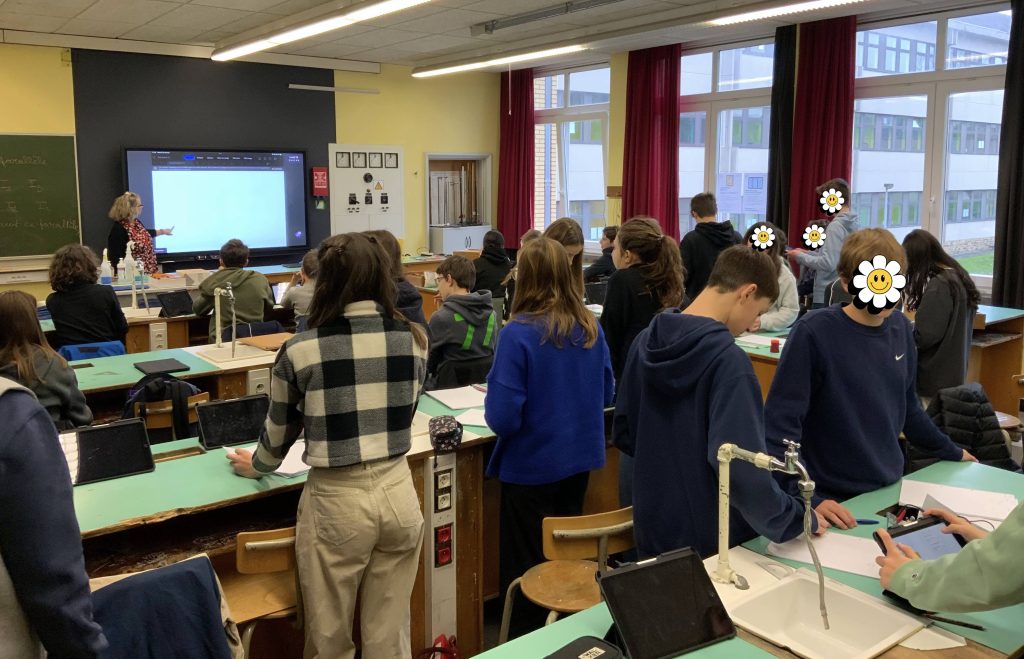
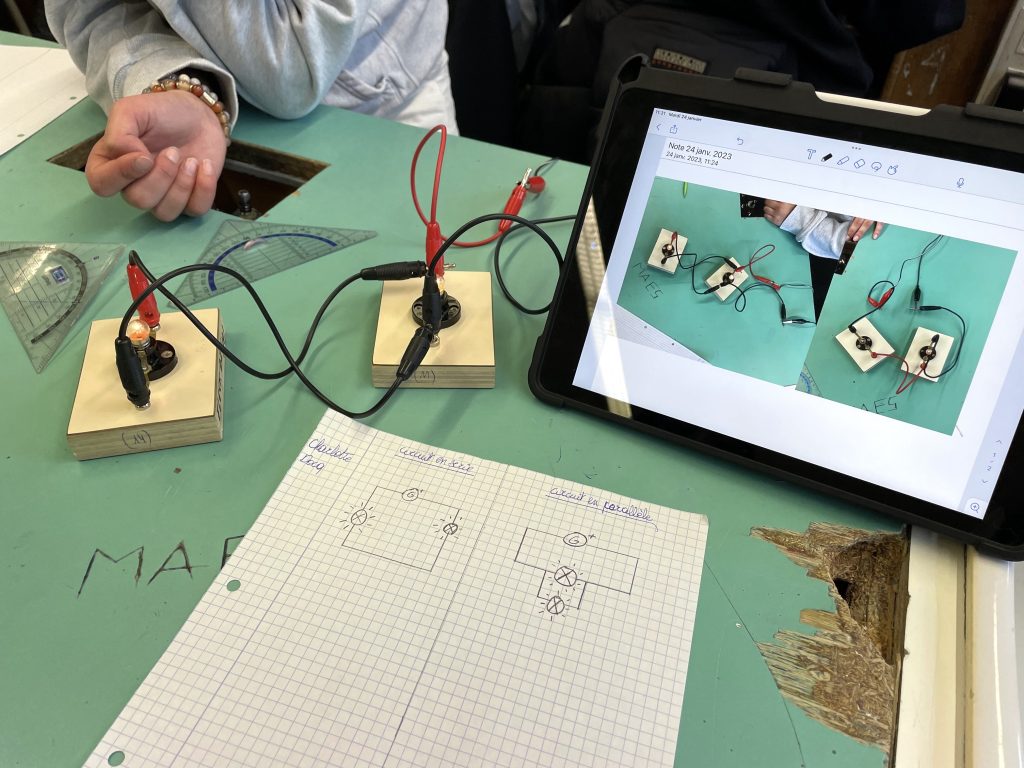
Un FabLab qui rassemble
Des élèves responsables de la radio étudiante ont vu notre passage comme une occasion de nous questionner sur les pratiques de chez nous. Nous avons donc été reçues en entrevue par un animateur bien préparé et un régisseur expérimenté à la console. Ils animent en effet tous les jours de courtes émissions sur les heures de pause. Ils choisissent les sujets, la musique et participent à créer une vie étudiante à leur image.
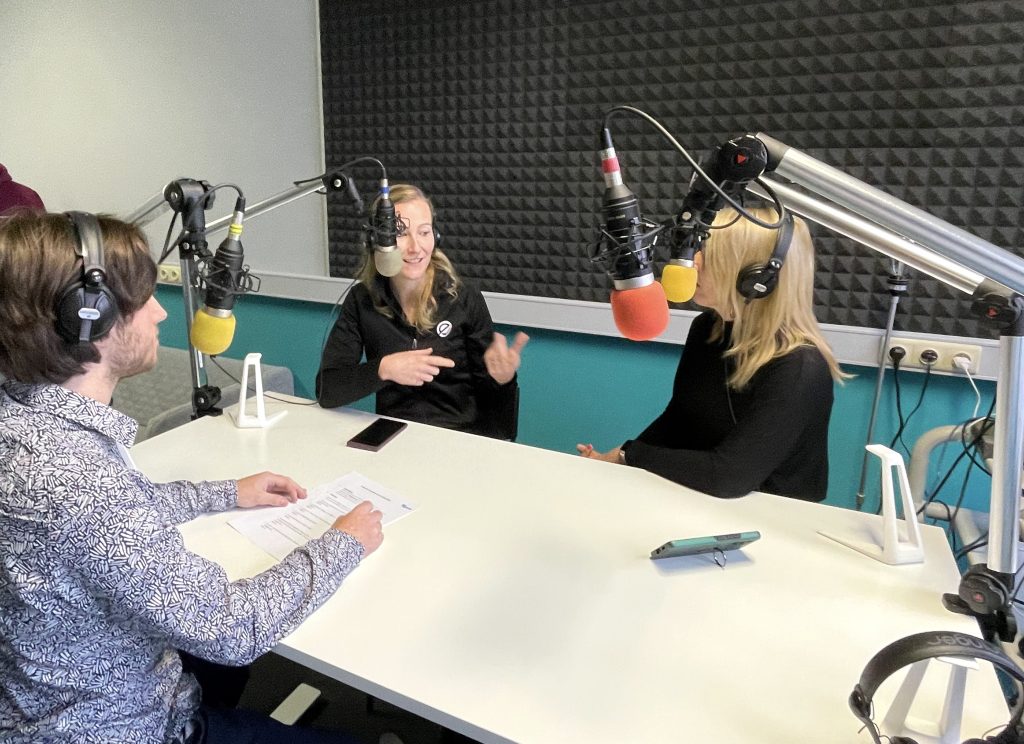
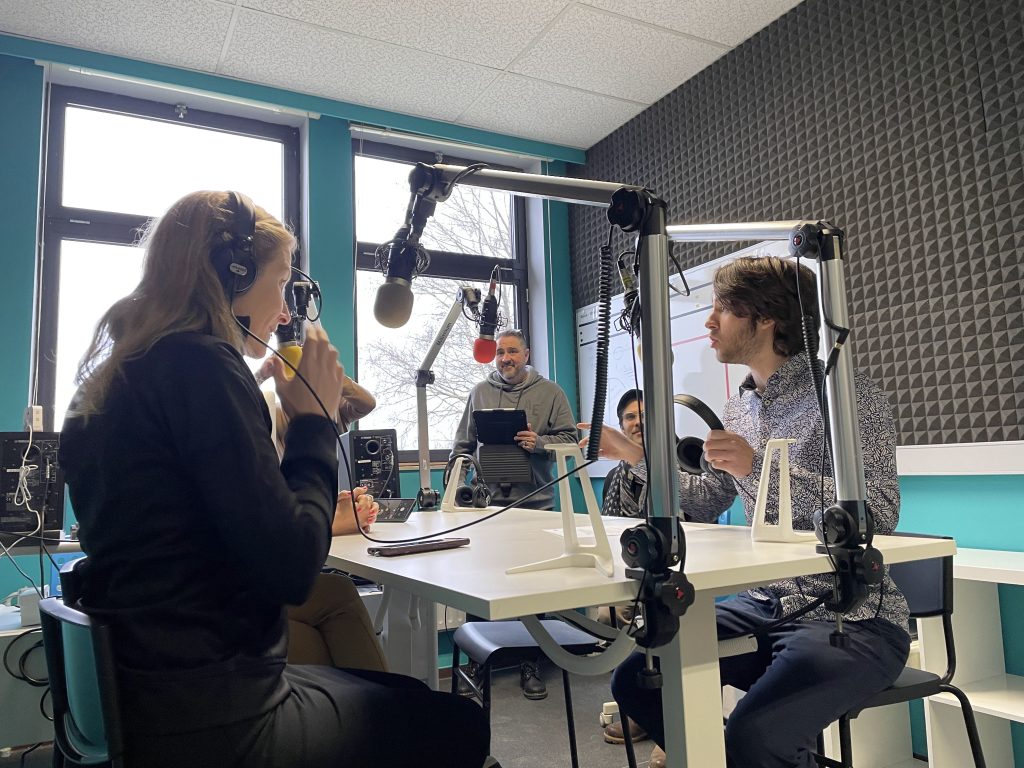
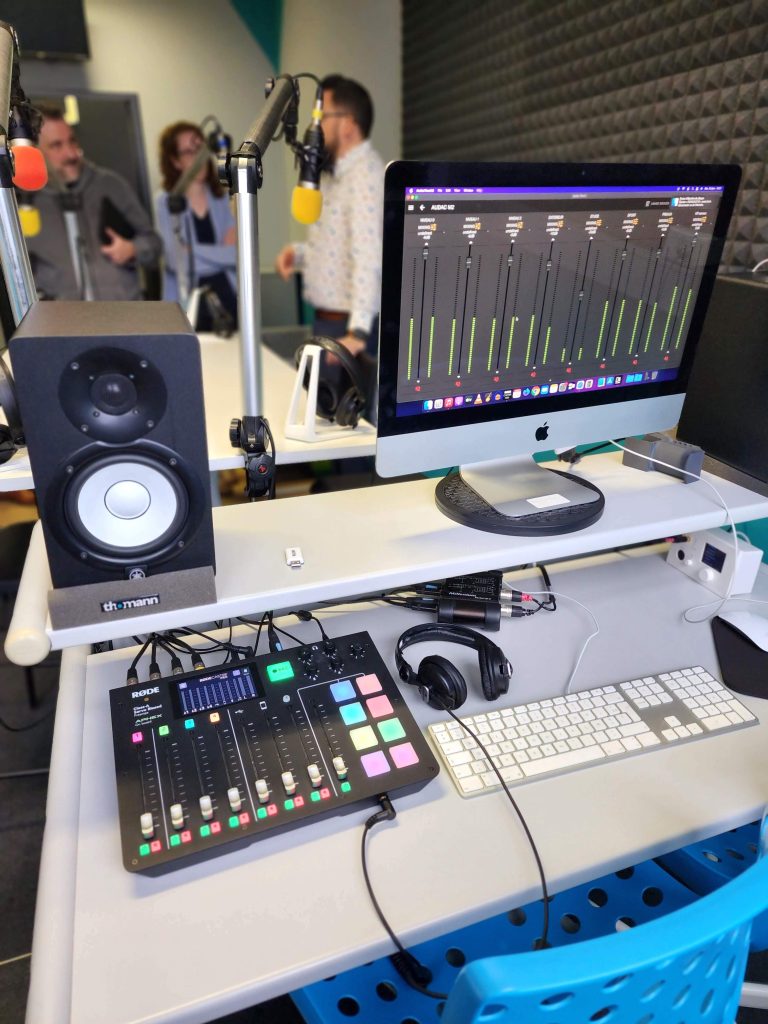
Après l’entrevue, nous avons visité le FabLab adjacent. Le FabLab est un laboratoire de fabrication numérique qui offre aux élèves des occasions d’explorer leur créativité et développer leurs compétences en matière de résolution de problèmes. Les élèves peuvent utiliser des outils tels que des imprimantes 3D, des découpeuses et graveuses laser et des machines Cricut, entre autres, pour concevoir et construire des objets concrets et utiles à leur communauté.
Par exemple, pendant la pandémie, ils ont produit de plus de 2 000 visières qu’ils ont distribuées dans les hôpitaux aux alentours, chez les médecins, les spécialistes de la santé (infirmières privées, kinésithérapeutes, etc.), aux policiers, aux commerçants de proximité et dans les institutions d’accueil pour personnes handicapées. Lors de notre passage, la graveuse laser mettait la touche finale au bouquet de médailles qui seront distribuées pendant le Carnaval de Nivelles.
Les jeunes sur place lors de notre passage ont pris plaisir à nous expliquer les nombreuses possibilités qui s’offraient à eux dans cet espace.
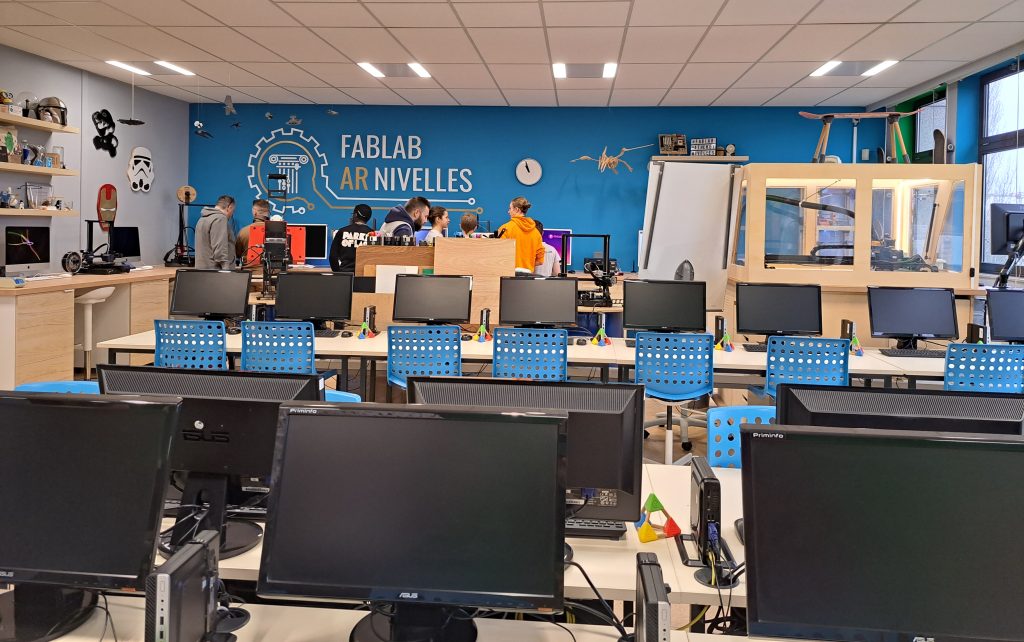
Encourager de telle sorte la créativité des élèves les aide certainement à développer des compétences importantes telles que la pensée critique, la résolution de problèmes et la communication. Lorsqu’ils sont encouragés à explorer leurs idées et à les mettre en pratique, les élèves développent une confiance en eux et une estime de soi qui les préparent autant pour leur futur professionnel que personnel.
Même au-delà des équipements technologiques omniprésents dans l’établissement, les collègues belges qui nous accompagnaient ont remarqué l’incroyable confiance qui était accordée aux élèves et qui leur permettait notamment de mettre en place des « clubs » variés sur l’heure du midi, tel un club de danse, de sport, de dessin, etc. Ces activités parascolaires, toutes menées par les élèves eux-mêmes, sont inexistantes dans la plupart des autres écoles où l’on préfère verrouiller et interdire l’accès aux locaux et au matériel en dehors des heures de cours.
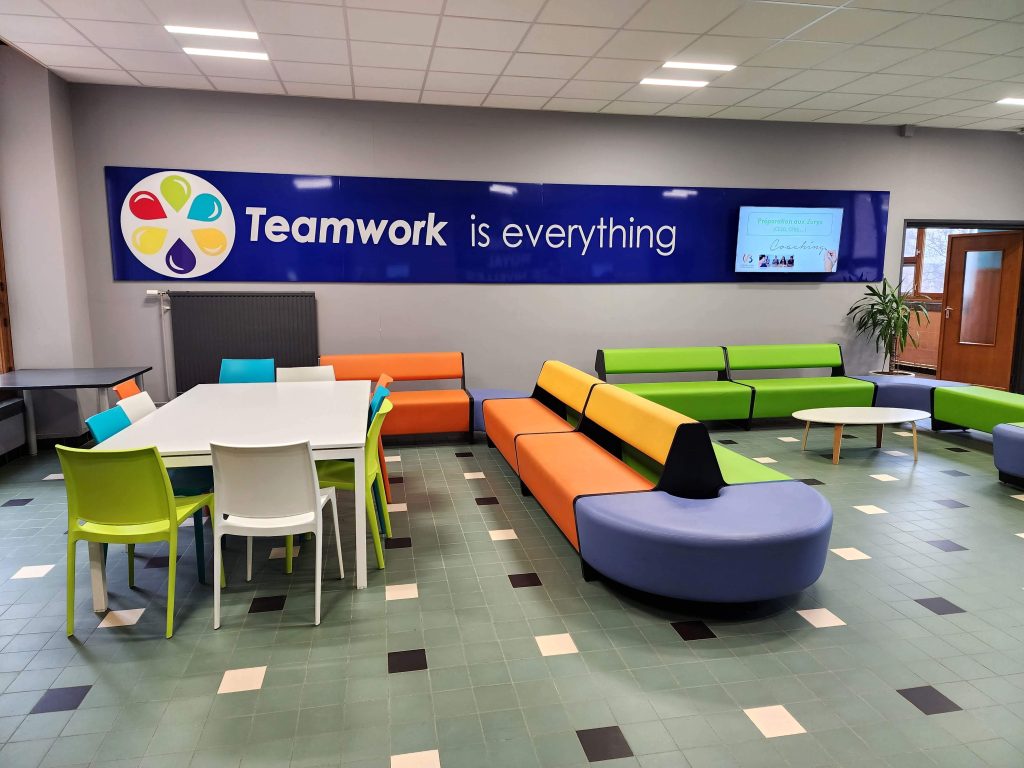
Un espace collaboratif à l’usage des élèves dans un corridor de l’établissement.
Alors qu’en Belgique, la promotion des écoles est nécessaire pour s’assurer d’obtenir des élèves dans un système où elles se retrouvent en grande compétition malgré leur caractère public, sans grande surprise, l’Athénée Royal de Nivelles refuse chaque année des centaines de demandes…
On peut faire une visite virtuelle de l’école ici!
Cette mission a été rendue possible grâce à la collaboration du Ministère des Relations internationales et de la Francophonie du Québec dans le cadre du 12e appel à projets Québec – Wallonie-Bruxelles.



